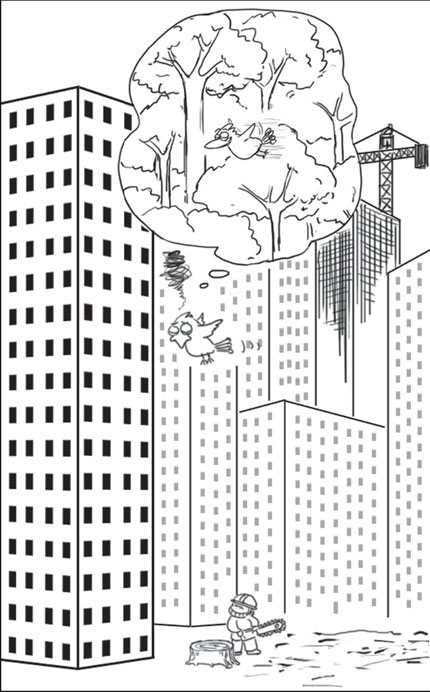Birds fly the coop in concrete jungles
As global leaders converge on the frigid Danish capital of Copenhagen to negotiate a successor agreement to the Kyoto Protocol, the first phase of which expires in 2012, the eyes of the world are upon China, one of the world's two largest greenhouse gas emitters.
In a bold and widely welcome move, China announced plans on November 25 to cut carbon emissions by up to 45 percent per unit of GDP in 2020. The promised reductions are based on the 2005 carbon emission levels.
|
|
|
Illustration by Zhou Tao. |
China's commitment to tackling climate change has given "extra momentum to negotiations at the Copenhagen summit," said Khalid Malik, United Nations resident coordinator and UNDP resident representative in China, last Tuesday in Shanghai.
Malik made the observation at the 30th Jiefang Cultural Forum titled "The UN's 30 years in China." It was jointly organized by UN agencies in China and the Jiefang Daily Group.
Apart from praising China for its "remarkable" achievement in fulfilling the Millennium Development Goals, Malik highlighted areas where the country could be doing better to secure a green future.
In response to questions about what can be done to bolster the UN's role in helping China become more environmentally sustainable, Malik said "if citizens of China are more aware of environmental protection, they can make a difference by holding officials like us more accountable."
"With its population of 1.3 billion, even small things like reusable chopsticks can have a huge impact on the timber industry globally," he added.
"The noble cause of environmental protection essentially boils down to the nuts-and-bolts contributions ordinary citizens can make," said Deng Yaping, deputy secretary of the Chinese Communist Youth League's Beijing Committee and China's Environment Ambassador.
Deng, a former world table tennis champion, cited surging population of Beijing's swifts as evidence of the power of bottom-up green initiatives. The species is widely distributed in temperate East Asia and is the archetype for "Nini," one of the 2008 Beijing Olympic Games mascots.
Due to a relentless building binge, the population of swifts - an enormous number of which once graced the city's skies - had dwindled to 3,000 around 2000.
Quaint old courtyards and drum towers were bulldozed to make way for sleek high rises, depriving the birds of nesting places, Deng said.
This started to change when a schoolboy named Zhao Du launched a campaign to protect the birds. Newspapers promoting his efforts to bring back the "auspicious messengers" created a groundswell of support.
"Thanks to this grassroots drive, the number of swifts in Beijing is now rising rapidly," said Deng at the forum.
Which reminds me of an episode in which a bird once strayed into our 38th floor office, setting off a panic as well as a frantic bid to trap and release the hapless animal.
Such random encounters with birds are likely to increase as they have difficulty navigating Shanghai's glitzy forest of plate glass and concrete blocks.
Indeed, ordinary citizens can start to save our environment by doing small, ordinary things, like consuming fewer pieces of paper tissue every day.
A greener life is not just a castle in the air, although many people, enthralled by the power of polluting machines, have forgotten it in their craze for GDP growth.
In some cases, the concept of environmental protection has been bandied about out of expediency, playing second fiddle to the "GDP growth cult."
It's ironic that some Chinese localities ranking near the lower end of the GDP spectrum are more sensitive to environmental protection than larger and supposedly more "enlightened" regions.
Take the Hani ethnic group in mountainous Yunnan Province. Reliant on the local flora and fauna, they have developed a philosophy of contentment and accommodation with what Mother Nature has to offer.
 0 Comments
0 Comments








Comments